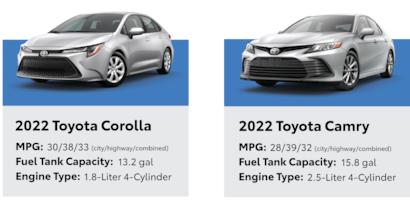Blitz News Digest
Stay updated with the latest trends and insights.
Fuel Efficiency: The Silent Savings Champion
Unlock the secret to savings! Discover how fuel efficiency can boost your budget and transform your driving experience.
Top 5 Tips for Maximizing Your Fuel Efficiency
Maximizing your fuel efficiency is essential for both saving money and reducing your carbon footprint. Here are the top 5 tips to help you achieve better mileage:
- Maintain Your Vehicle - Regular maintenance, including oil changes and air filter replacements, ensures that your vehicle runs smoothly and efficiently. A well-maintained car can improve fuel efficiency significantly.
- Drive Smoothly - Aggressive driving, including rapid acceleration and hard braking, can waste gas. Aim for a smooth driving style by accelerating gently and anticipating stops to minimize sudden changes in speed.
- Reduce Weight - Extra weight in your vehicle can lead to increased fuel consumption. Remove unnecessary items from your trunk and consider opting for lighter items when packing for trips.
- Use Cruise Control - On the highway, using cruise control can help maintain a consistent speed, improving your fuel efficiency and reducing the frequency of speed changes that can negatively impact your mileage.
- Check Your Tires - Ensure that your tires are properly inflated. Under-inflated tires can increase rolling resistance, leading to decreased fuel efficiency. Regularly check tire pressure and alignment to keep your vehicle performing at its best.

How Do Driving Habits Impact Fuel Efficiency?
Driving habits play a crucial role in determining a vehicle's fuel efficiency. For instance, aggressive acceleration and braking can significantly decrease the miles per gallon (MPG) a driver achieves. Studies have shown that smooth driving, characterized by gradual acceleration and deceleration, can improve fuel efficiency by up to 30% in city driving conditions. Maintaining a steady speed and utilizing cruise control on highways can also contribute to better fuel consumption, making it essential for drivers to adopt more mindful habits behind the wheel.
In addition to acceleration patterns, other driving behaviors such as speed can have an impact on fuel efficiency. Most vehicles are designed to operate optimally within a certain speed range, typically between 45-65 mph. Exceeding this range can lead to a considerable increase in air resistance, causing the engine to work harder and consume more fuel. Furthermore, frequent idling should also be minimized, as it wastes fuel without contributing to travel distance. Adopting eco-friendly driving practices not only conserves energy but also leads to long-term savings at the pump.
The Hidden Cost of Poor Fuel Efficiency: What You're Really Spending
When it comes to vehicle ownership, fuel efficiency is often a critical factor that is overlooked until it’s too late. Many drivers focus solely on the sticker price of fuel, but what they fail to consider is the long-term impact of poor fuel economy. According to estimates, the average driver commutes over 12,000 miles each year. If your car gets just 10 miles per gallon instead of 25, you could be spending an additional $1,200 annually on fuel costs alone. That's a substantial amount that could have been put towards savings, emergencies, or even a vacation.
Furthermore, the hidden costs of poor fuel efficiency extend beyond just fuel prices. Owning a vehicle that guzzles gas can lead to increased wear and tear on other operations of the car, resulting in frequent repairs or even premature replacements of parts. For instance, a less efficient engine may also exert extra strain on components like the transmission and exhaust system, which can amount to hundreds of dollars in additional maintenance costs each year. In essence, by prioritizing fuel efficiency when choosing a vehicle, one can save significantly in both fuel and maintenance expenses, ultimately leading to a healthier financial situation.